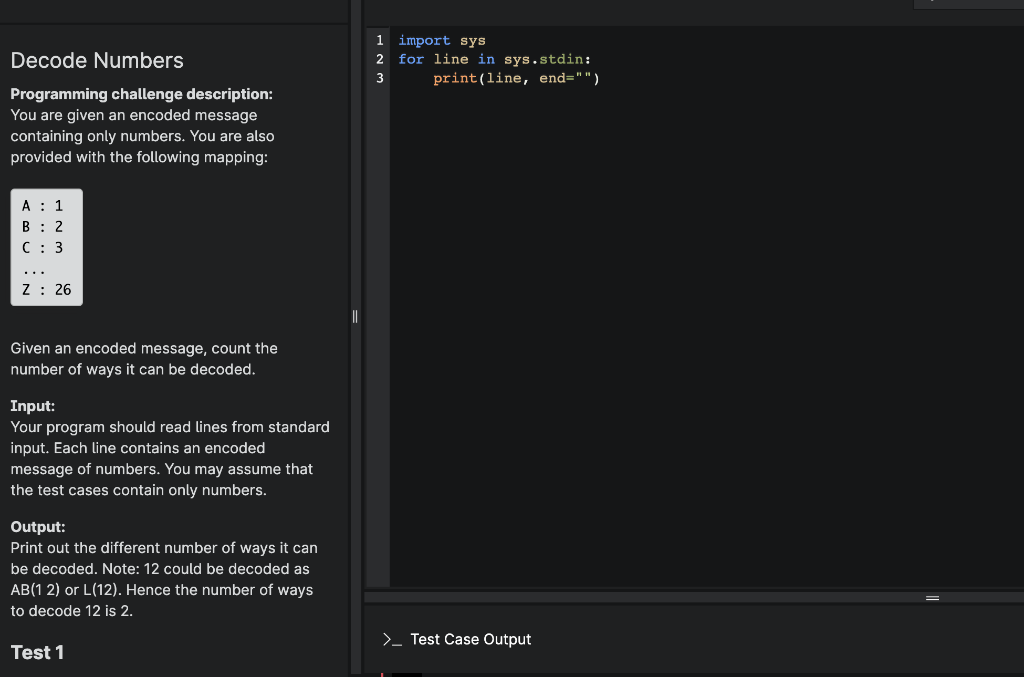Question: def numDecodings(self, s: str) -> int: n = len(s) dp = [0 for i in range(n)] if s[0] != 0: dp[0] = 1 for i

![[0 for i in range(n)] if s[0] != "0": dp[0] = 1](https://dsd5zvtm8ll6.cloudfront.net/si.experts.images/questions/2024/09/66f3b7b6827fc_30966f3b7b5d908d.jpg)
def numDecodings(self, s: str) -> int:
n = len(s)
dp = [0 for i in range(n)]
if s[0] != "0":
dp[0] = 1
for i in range(1,n):
x = int(s[i])
y = int(s[i-1:i+1])
if x >= 1 and x
dp[i] += dp[i-1]
if y >= 10 and y
if i-2 >= 0:
dp[i] += dp[i-2]
else:
dp[i] += 1
return dp[-1]
i am getting error when i run my code. how do i modify my code to un when i read from stdin. same format as -
import sys for line in sys.stdin: print(line, end="")
![for i in range(1,n): x = int(s[i]) y = int(s[i-1:i+1]) if x](https://dsd5zvtm8ll6.cloudfront.net/si.experts.images/questions/2024/09/66f3b7b74d72f_31066f3b7b6b2469.jpg)
![>= 1 and x dp[i] += dp[i-1] if y >= 10 and](https://dsd5zvtm8ll6.cloudfront.net/si.experts.images/questions/2024/09/66f3b7b83a8e5_31166f3b7b79b195.jpg) in python 3 pls
in python 3 pls
1 import sys 2 for line in sys.stdin: 3 print(line, end="") Decode Numbers Programming challenge description: You are given an encoded message containing only numbers. You are also provided with the following mapping: B: 2 C: 3 Z: 26 Given an encoded message, count the number of ways it can be decoded. Input: Your program should read lines from standard input. Each line contains an encoded message of numbers. You may assume that the test cases contain only numbers. Output: Print out the different number of ways it can be decoded. Note: 12 could be decoded as AB(1 2) or L(12). Hence the number of ways to decode 12 is 2. >_ Test Case Output Test 1 Print out the different number of ways it can be decoded. Note: 12 could be decoded as AB(1 2) or L(12). Hence the number of ways to decode 12 is 2. i import sys 2 for line in sys.stdin: 3 print(line, end="") Test 1 Test Input 12 Expected Output 0 2 Test 2 Test Input 0 123 Expected Output 3 Copyright 2012-2021 by HireVue. All rights reserved. Unauthorized copying, publication, or disclosure prohibited. >_ Test Case Output 1 Print out the different number of ways it can be decoded. Note: 12 could be decoded as AB(1 2) or L(12). Hence the number of ways to decode 12 is 2. 2 3 4 5 n = Test 1 6 7 8 Test Input 9 10 12 import sys for line in sys.stdin: print(line, end="") def numDecodings (self, s: str) -> int: len(s) dp [0 for i in range(n)] if s[0] != "0": dp[0] = 1 for i in range(1, n): X = int(s[i]) y = int(s[i-1:i+1]) if x >= 1 and x = 10 and y = 0; dp[i] += dp[i-2] else: dp[i] += 1 return dp[-1] 11 Expected Output 6 12 13 14 2 15 IL 16 Test 2 17 18 19 Test Input 20 123 Expected Output @ 3 10 12 X = int(s[i]) Expected Output >_ Test Case Output 2 II Running test cases... Done Test 2 Test 1 x Failed Test Input @ 123 Test Input: 12 Expected Output 6 Expected Output: 3 2 Your Output: 12 Copyright 2012-2021 by HireVue. All rights reserved. Unauthorized copying, publication, or disclosure prohibited. Test 2 X Failed
Step by Step Solution
There are 3 Steps involved in it

Get step-by-step solutions from verified subject matter experts


